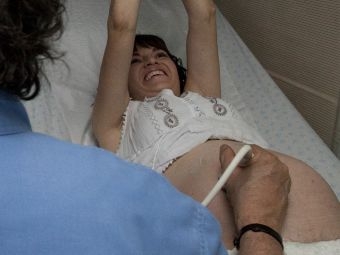 These days, prenatal testing for Down Syndrome and other genetic conditions is relatively invasive. To get a firm diagnosis, a pregnant woman must undergo either amniocentesis or chorionic villus sampling, both of which carry a small risk of miscarriage. But a new blood test on the horizon may soon make it easier and safer to test for Down Syndrome early on in a pregnancy.
These days, prenatal testing for Down Syndrome and other genetic conditions is relatively invasive. To get a firm diagnosis, a pregnant woman must undergo either amniocentesis or chorionic villus sampling, both of which carry a small risk of miscarriage. But a new blood test on the horizon may soon make it easier and safer to test for Down Syndrome early on in a pregnancy.
For many health professionals, organizations and parents, prenatal genetic testing brings withit a host of ethical and personal questions. We talk to Dr. Robert Macauley, the medical director of clinical ethics at Fletcher Allen and the UVM College of Medicine, and Dr. Leah Burke, a pediatric geneticist and the director of the Vermont Regional Genetics Center about negotiating difficult medical and ethical decisions. And we hear from Eileen Haupt, whose 12-year-old daughter has Down Syndrome.
Also on the program: last week the Health Department issued a warning that people should not make contact with floodwater because it may contain sewage. We talk to Vermont Health Commissioner Dr. Harry Chen about the safety of local lakes and rivers in the wake of recent flooding.
Health Department information on water testing
Two psychological counseling centers are available for flood victims:
- Washington County Mental Health: (802) 229-0591
- Northwestern Counseling and Support Services: (802) 524-6554